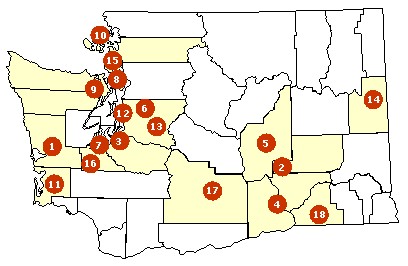Navigation: Overview, 18 case studies - Summary, 1. Aberdeen School District, 2. City of Othello, 3. Crossroads Treatment Center, 4. ESD 123, 5. Grant County Prevention & Recovery, 6. Lake Washington School District, 7. North Thurston School District, 8. Oak Harbor School District, 9. Olympic ESD 114, 10. Orcas Island School District, 11. Pacific County Health & Human Services and Willapa Children's Service, 12. Seattle Public Schools, 13.Snoqualmie Valley Community Network, 14. Spokane County Community Services, 15. Swinomish Tribe, 16.Together!/ROOF/Rochester, 17. Toppenish Police Department/City of Toppenish, 18. Walla Walla County Dept of Human Services
For each community grantee, a number of pieces of information have been combined to provide a context for program and community level results.
- Executive summaries: An executive summary that combines information from the two process evaluation reports is the first item in each community grantee's outcome section.
- Community Guidebook: Following the combined executive summary are two pages of narrative and graphics that concisely describe individual community projects and the action plans associated with those projects. These pages are taken from the Community Guidebook, created by Margaret Shaklee and other state level SIG administrative staff.
- Logic Model: The third section of each community grantee's outcomes report is the community's logic model, formally known as the Community-Based Prevention Action Plan Implementation Matrix. Commonly referred to as the matrix, this instrument serves as each grantee's contractual work order and as a tool for the identification of anticipated immediate outcomes, as well as prevention program selection.
- Community Grantee Process Evaluation Reports: Two process evaluation reports are available for each community grantee, one for mid-1999-2000, the other for mid-2000-2001. Reports contain site descriptions, prevention histories, progress made toward the five community level objectives, and successes and challenges experienced by the community grantees.
- Program and Community Outcomes: Program outcomes were analyzed for prevention programs with rigor level three or above and with adequate numbers of completed pre- and post-tests to allow for meaningful statistical analysis. The results of these analyses are presented in graphic form, with a table and chart for each program. The software used to report program outcome data is the Everest Program Outcome Monitoring System. Methods used is described in the general report. Community outcome will be analyzed when data and funding becomes available
|
|
"Introduction to Community Reports: Washington State Incentive Grant." Publication Date: 12/2002. |
|
Select a community in Washington State to learn more about the prevention in that community.
|
|
Navigation of 18 Case Studies: Summary, 1. Aberdeen School District, 2. City of Othello, 3. Crossroads Treatment Center,4. ESD 123, 5. Grant County Prevention & Recovery, 6. Lake Washington School District, 7. North Thurston School District, 8. Oak Harbor School District, 9.Olympic ESD 114, 10. Orcas Island School District, 11. Pacific County Health & Human Services and Willapa Children's Service, 12. Seattle Public Schools, 13.Snoqualmie Valley Community Network, 14. Spokane County Community Services, 15. Swinomish Tribe, 16. Together!/ROOF/Rochester, 17. Toppenish Police Department/City of Toppenish, 18. Walla Walla County Dept of Human Services |
Other Information
Included information:
- Evaluation Report on the Spring 2001 Collaborative Assessment Process(4.41)
- Washington State Incentive Grant, State and Community-Level Evaluation Report, Autumn 2000 (4.37)
Related information:
- Risk and Protection Profile for Substance Abuse Prevention for Washington State and its Counties (4.15, 4.33, 4.40, 4.47)
- Washington State Incentive Grant Substance Abuse Prevention Plan
- Research Based Prevention Outcomes, State Incentive Grants | SIG(4.58)

